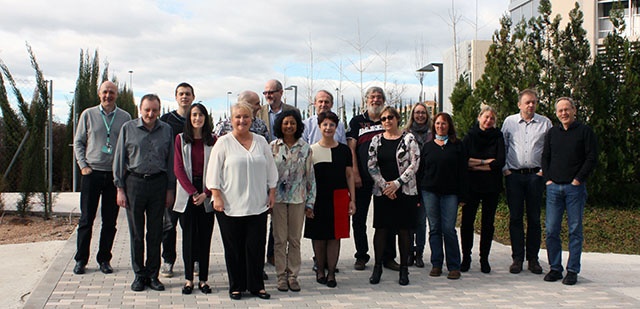The 6th and 7th of February has been held in the Science Park of the University of Valencia (PCUV) the kick-off meeting of the project “PROTECTED” (PROTECTion against Endocrine Disruptors; detection, mixtures, health effects, risk assessment and communication). This event was organised by its coordinators, Professor Lisa Connolly and Dr. Jodie Wilson from the Queen’s University of Belfast, in collaboration with the PCUV’s company ProtoQSAR.
The PROTECTED project has been selected by the prestigious Marie Skłodowska-Curie Actions (MSCA) Innovative Training Network (ITN) programme, an initiative by the European Commission (EC) to foster academic-industrial collaboration in the frame of an innovative and entrepreneurial PhD training program.
PROTECTED aims to develop expertise and protective capabilities against Endocrine Disruptors (EDs). EDs and their mixtures are a modern day health concern leading to failing ecological systems, poor agricultural production and health effects such as obesity, cancer and infertility. While analytical methods have advanced enormously, focus has been mainly on synthetic chemicals, overlooking emerging EDs and real-life multiple substance exposure. A new generation of creative, entrepreneurial and innovative early-stage researchers equipped with skills to assess and understand the real-life risk of complex mixtures of EDs and trained to convert resulting knowledge and ideas into accessible tools and services for the long-term control of potential ED risk is urgently needed.
The PROTECTED Innovative Training Network proposes a holistic approach by providing 15 individual, personalised research projects with exposure to scientific, innovative and entrepreneurial training mobility across the ITN. The intersectorial network is comprised of 12 training sites at academia, research centres, a bioassay technology SME, a QSAR technology SME, water provider, and animal feed supplier. Together they cover multiple disciplines including analytical science of food, feed, and environment, epidemiology, risk assessment, social science and toxicology. This combined expertise enables a highly focused program for developing novel tools and concepts and training for the detection, analysis and improved risk assessment of EDs, especially mixture effects. Methodology will include emerging technologies; multiplexed analysis, mixture modelling, mechanistic and exposure studies, explants and cell or whole organism bioassays.
The project will provide a unique and high level of training for a new generation of specialists with transferable skills and enhanced career perspectives. In total, 15 Early Stage Researchers (ESRs) will be appointed by the PROTECTED consortium for 36 months each. These specialists will ultimately aid the efficient development of future control strategies for improved health.
The aim of the ESR at the PCUV’s company ProtoQSAR will be to develop computational predictive models for the effects of EDs and their mixtures, and apply virtual screening methods in order to propose safer alternatives. Predicting the ED effects of specific groups of chemicals (POPs, plasticisers, PAHs, mycotoxins and algal toxins) and their mixtures will be achieved through the use of advanced in silico techniques, mainly predictive quantitative structure-activity relationships (QSAR) models.


